When I was younger, I often felt self-conscious and socially awkward. In fact, one of the reasons I wanted to become a Behavioral Scientist was to be better socially.
If you often feel anxious and embarrassed, this guide is for you. It will give you the tools you need to be more relaxed in social settings, get out of your head and into the conversation.
This guide is for anyone who’s feeling overly self-aware, but examples are geared toward adults in work or at college.
Note: Sometimes, the underlying reason for self-consciousness is social anxiety. If this is the case for you, here’s our list of the best books on social anxiety.
Let’s get started!
1. Focus on someone or something
Self-consciousness comes from being overly concerned with how people see us. We worry that we won’t be seen as smart, attractive, or that others are judging us.
It can be exhausting, and with too little evidence to support the argument in either direction, we go straight to the most negative conclusion.
To get out of this pessimistic mindset, try shifting your attention to the people around you and your environment.
Focus not on what others think of you but on learning about the people you’re with. Make it a point to find out one thing about every person you meet. It could be their job, their major, or what they did on the weekend.
The objective is to get out of your head. Put that energy into the people around you rather than into feeding an inner dialogue that’s holding you back.
2. Question your inner critical voice
It’s easy to believe the negative voice inside our head is always right. But have you tried questioning it? You might find out that it has little to do with what’s real.
Check the evidence from your life:
Can you recall a time you did something that proves your inner critic wrong? For example, if your voice says, “I always mess up around people,” remind yourself of a time when you did just fine.
Ask yourself if what you are feeling is reasonable. Or, are you letting a perception you think others have of you, run the story in your head?
3. Know that people notice you less than you think
In an experiment, students were asked to wear an embarrassing t-shirt.
By the end of the day, the students who wore the shirts estimated that 46% of the class had noticed. When polled, only 23% of their mates actually had.[1] In other words, their embarrassing t-shirt was only half as noticeable as they had thought.
What feels mortifying to us is usually having little to no impact on others. People are caught up in their own thoughts and struggles, too busy to worry about ours. The best thing we can do is remind ourselves that no one cares as much as we do, and even our own filter is not a perfect lens.
4. Know that it’s OK to say some stupid things
I remember talking to a girl I was crushing on when I was in high school. She was talking about how her brother liked a band, and like a crazy person, I said, “Ya, I know.” Like somehow, I knew what group her brother liked. My crush looked at me strangely but kept going.
Did it make any difference to my crush? Not really. At this point, I can laugh about it, but at the time it felt humiliating.
Try turning the tables on the situation. Would you care if someone blurted out something silly? Or would it just pass you by without giving it extra thought? It’s better to talk freely even if you say something stupid every once in a while. The alternative is to always guard yourself, and that can make you come off as stiff and aloof.
5. Don’t try to fight your feelings
Emotions tend to cling harder when we fight them and weaken when we accept them.[2]
When you are anxious, and feeling uncomfortable in a social setting, what are you thinking about? How does thinking about that make you feel? Happy, sad, nervous, jealous? What’s your body doing when you’re in your head and feeling awkward at a party? Are you sweating, jumpy, yawning a lot (a reaction to nerves)?
Simply accept how you feel rather than trying to change it.
Now focus outward. Talk to someone. Ask them how they’re doing. What brings them to this party/event? Do they know anyone? Then check your head. How do you feel when you’re talking to someone? Do you get any less nervous as the conversation goes on? If you were blushing, has it subsided yet?
Practice going back and forth between your inner thoughts and how you feel when you are talking to others. See if you feel better when you’re in your head, listening to your internal dialogue, or when you’re spending your energy on others.
6. Focus on your positive traits
This isn’t “think happy thoughts, and you’ll be fine.” Instead, you want to base your self-worth on your real, positive qualities rather than cynical and questionable self-talk. This is what we know is true:
- You have talents and abilities that give you fundamental value.
- This combination of characteristics makes you unique and memorable.
- You are worth spending time with and knowing.
Try to list your concrete skills like your mathematical ability, you’re a good writer, you’re multilingual, you’re a great cook. Then there are your personality traits. You’re kind, honest, genuine, funny, enthusiastic, etc.
Even if you can’t make a full list today, write one positive quality down every day and then review the list every week. When you have a comprehensive list, read it every day. You’re training your mind to focus on what you do well and to be able to access it quickly.
7. Make sure you’re reading the situation right
Negative experiences can teach us to be on guard and defend ourselves from criticism and hurt. This can affect how we perceive the world and the people we encounter.
Those of us who are overly self-conscious might believe the world will judge us harshly because that is what we’ve experienced. However, as I’ve pointed out, people don’t care that much about how we act or what we say. Every new person you meet thinks of you as a blank slate.
When you’re in a scary social situation, ask yourself, “Is there a chance my past experience is affecting how I’m seeing this interaction? Is there another, more realistic way I can approach his conversation?”
Believe people will be friendly, and most of the time, they will be. If not, it says more about them than you.
8. See yourself as a social observer
People watching is fascinating, and it shows us how our basic humanity makes us all messy, foolish, and funny. Go to the mall, grab a coffee/tea, and watch people walk with their friends. Listen in as they sit beside you and talk, or as they chase their kids down the hall.
Now notice their body language, their tone of voice, and eavesdrop on what they’re saying. What we’re doing is training you to switch your focus from yourself to others and to think objectively about what you’re witnessing.
Are people relaxed or stilted? Is their posture good, or are they slouching? When they talk, are they quiet, or does the volume go up and down with excitement? The more we see others being their imperfect selves, the more we’ll realize this is what ‘normal’ looks like.
Go into this observer mode when you walk into a room of strangers. It can help you be less self-conscious.
9. Assume that people will like you
This one is about the mechanics of being seen as confident rather than inhibited or self-conscious. When we feel uncomfortable, it can make us talk softer, hug our bodies with our arms, and speak faster to get the words out and move the focus off us as soon as possible. It can make us seem aloof, and even if we don’t intend to, it makes us less approachable.
Be confident and friendly right off the bat. Walk up to people with a warm smile and present yourself. If you’re uncertain about the details, look at how likable, confident people do it and learn from them. Assuming people will like you is a self-fulfilling prophecy. Assuming they won’t is, too.
10. Ask about others to take the focus off you
It’s easier to focus on someone else other than ourselves. When you meet someone for the first time, ask them what they do for fun. What are their hobbies, or do they have any pets? Listen carefully, nod, and give them signs that you are enjoying their story. Then add anything relevant that applies from your life. Things like your pets – what kind are they, their name, breed…or your hobbies. At the end of the day, you want to have a balance between learning about them and sharing about yourself.
The goal is to learn about someone else because it’s hard to be self-conscious when you’re focused on getting to know another’s interests and stories.
11. Make internal progress checks, not comparisons
Jealousy is a miserable emotion. It makes you feel small and worthless and sucks the joy out of everything. It’s like anger directed at someone else, but you are the one who feels crappy.
Avoid both overexaggerating someone else’s talents or trying to find flaws in them to make yourself feel better. No one is perfect, and tearing them down when you feel envious just retains the focus on you because you are still comparing yourself to someone else.
Here’s a thought: What if we were OK with the fact that someone is more accomplished than us? When we accept this, it helps us see ourselves differently.
Our value then has nothing to do with how successful we are or how good we are at something. We want to go from “I like myself because I’m good at…” to “I like myself.” (Period.) This makes our self-acceptance unconditional.
How do we accept that others are more accomplished than us and be OK with that? First, let that fact sink in, and allow all your emotions of envy and sadness to come to you. Accept those emotions rather than fight them. Now, you no longer need to fear them. Afterward, you will be less prone to comparisons.
Here’s another way to do it:
Instead of thinking, “Well, at least I’m better than them when it comes to X.” Say, “I’m not good at everything, which is OK because my value isn’t based on my achievements. I have value because I am 100% myself”.
Let’s talk more about how to be more self-accepting…
12. Practice accepting yourself
Self-acceptance is one of the biggest steps we take towards achieving self-confidence.
According to Aaron Karmin, MA, LCPC, a psychotherapist in Chicago, Ill, a person “who accepts [themselves] unconditionally as a worthwhile human in spite of [their] faults and imperfections does not experience the stress of self-consciousness.”.[3]
Here are some things you can do to accept yourself:
- Decide how you are going to live your life. Will you let others define your personal image, your strengths, and your weaknesses? Try to move from blame, doubt, and shame to tolerance, acceptance, and trust.
- Make a list of all your good points.
- What do you do well?
- What are you proud of accomplishing?
- Whose lives have you made better?
- Connections you’ve made with others.
- Hardships you have overcome.
Review the list often, so you see your progress and acknowledge your gifts.
- Take an inventory of the people close to you.
- Are they good for you?
- Do they reinforce negative self-talk?
- Do they criticize or demean you?
Consider eliminating all the negative influences in your life.
- Surround yourself with a positive support group of people who celebrate you.
- Forgive yourself. If you made a mistake, realize you did your best with the information you had at the time, or you simply made a bad choice. But now you chose to move on and forgive yourself.
- Silence your inner critic. Just because it’s hard to hear doesn’t mean it’s right or 100% true. If you wouldn’t talk to someone else like you speak to yourself, why is it OK to do it to you? You’re human like everyone else. Treat yourself as well as you treat anyone else, if not better.
- Move on from your unrealized dreams. You can’t change the past. All you can do is move forward and continue to pursue your current goals.
- Help yourself see how you make others’ lives better. It’s harder to see yourself in a harsh light when you acknowledge all the good you do.
- Let it go – You can’t control everything. It’s not resignation. It’s a realization that your energy is better spent elsewhere instead of railing against the things you can’t change.
- Try to solve your problems one at a time. First, step outside your head where all the worry and self-doubt resides. Take a dispassionate look at what you need to do to move past each issue. You could even try imagining that the problems you’re facing are someone else’s (if that helps you get away from your internal thoughts). Ask yourself what advice you’d give them (yourself) to help?
- Practice Self-compassion – accept your flaws and love yourself anyway. Simple words, but for most of us, it takes years, if not a lifetime to master this step. The more you do it, the better you’ll get in every respect.
- Even though you may not have much experience being kind and compassionate with yourself, you will start to believe these good things you’re telling yourself. Especially if you keep this positive internal monologue up. In many instances, it took years to get to this place of insecurity. It will likely take weeks and months to see progress and make permanent changes to your mental habits.
13. Practice thinking about other’s needs
Try doing thoughtful things for others. Consider their struggles, worries, dreams or regrets. When you do, you take the focus off yourself and you’ll connect with them. This will help you be less self-conscious.[4] It will also show others that you are caring, and you value them. Done selflessly, it will bring good things back to you.
Here are some suggestions:
- Smiling at someone after you meet them. It could be a friend, family member, or acquaintance. Let the smile happen as you talk to them, so they know you are smiling just for them because it grows after you say, ‘Hi.’
- Hold a door for someone.
- Give a spontaneous compliment.
- Bring a friend or co-worker cookies or a pre-made dinner if they are sick or need a pick-me-up.
- Pay it forward. Pay for the coffee or drive-thru meal of the people behind you.
- Keep your area tidy and organized if you work in an open-concept office.
- Send cards for different occasions or for no occasion at all.
- Give someone 100% of your attention and note what they say so you can follow up later. (Ask them how ‘it’ went. Make sure they are OK afterward.)
- Consciously spend a few minutes every day thinking of the things you are grateful for.
A word of caution: Do not do these things to gain others’ approval. That puts the focus back on you. Do it out of sincere consideration for others. The purpose of the exercise is to focus on others and their well-being. When you do, you’ll become more compassionate and less self-conscious.
14. Consider talking to a Therapist
If your self-consciousness is inhibiting you or is a result of social anxiety, a therapist can be helpful. Having social anxiety is more common than we think, and deciding to understand and address the effect it has on your life is brave. A Psychologist or a Therapist will help you talk through your feelings, find out where they originate from, and give you the tools to unpack them and move forward.
We recommend BetterHelp for online therapy, since they offer unlimited messaging and a weekly session, and are cheaper than going to a therapist's office.
Their plans start at $64 per week. If you use this link, you get 20% off your first month at BetterHelp + a $50 coupon valid for any SocialSelf course: Click here to learn more about BetterHelp.
(To receive your $50 SocialSelf coupon, sign up with our link. Then, email BetterHelp’s order confirmation to us to receive your personal code. You can use this code for any of our courses.)
You can also try contacting your insurance company or doctor for recommendations.
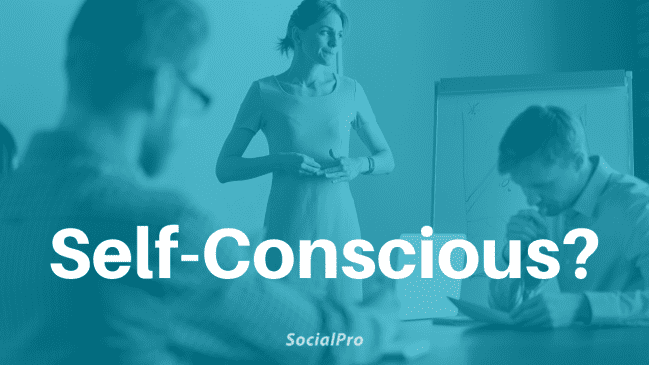





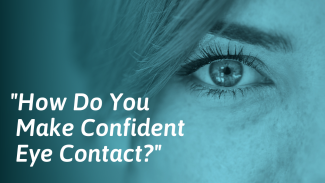

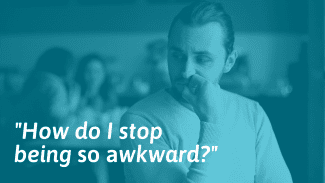
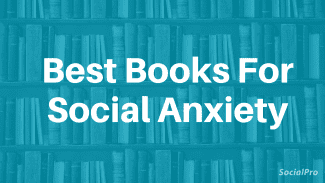

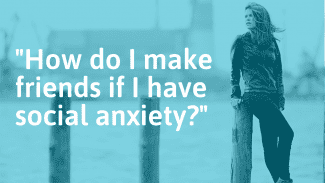
When I have to do any sort of public speaking in school, I often get nervous and have a panic attack. I worry that people judge me because of my panic attacks, and so I avoid talking to anyone in any classes that I know are going to have a lot of public speaking assignments.
I’m exactly like you but I’m not nervous anymore because I tell myself if I believe in me there’s nothing to be afraid of so you should talking to yourself like a video and then watch it and little by little you’ll see your progression
My face gets red when I’m nervous or on the spotlight during social situations. I can feel it and so I over think it and worry that I’m being judged because it clearly shows that I’m anxious or nervous towards others which therefore makes me lose the ability to come up with anything else to say and then get very quiet or awkward.
When I open my mouth around people, strangers I feel like they would judge what I am saying and they don’t listen my point of view
When I open my mouth around people, strangers I feel like they would judge what I am saying and they don’t listen my point of view
I am the most anxious about people thinking that I am boring and that i am not funny. I also have nothing to talk about because I feel like I have no personality and there is nothing special about me. Whenever people ask: ‘Have you watched this film’ I never know what they are on about so I feel like I cannot relate and then the conversation come to a halt. I literally have nothing to say and I am not good at telling stories because I don’t think they are stories worth telling because they won’t make people laugh.
I totally get it. Something that helps me is culturing myself. Pick an art or area of culture that interests you and learn about it bottom to top, then you have something to talk about. Its a good idea to start off reading wikipedia pages. Reddit and Tumblr are also good for immersing yourself in culture. Good luck brother!
This is so true. During a recent social event I had with my club members in college, I realized that some of the members who seemed very social and confident previously, were actually being shy and nervous towards me. During our dinner together, I had several people sat across me and I tried to talk to them and engage in conversations and I could just FEEL that they, even the confident ones, were literally talking to each other (who were already friends) and avoiding eye contact with me. I could feel them being nervous. At first, I thought ‘Are they avoiding my eye contact? Don’t they wanna be friends with me?’ but then as I reflect, I could see that they were just afraid to approach to a stranger. I totally agree with you David, on the note that the one who puts their guard down first is the one who wins ultimately.
Yeah I’m fedup with feeling like a outsider I often have people just talk over me Wen I’m saying stuff it makes me feel worthless
I seem to over-analyze my anxiety and worry of people’s perception of me. I rely too much on how I ‘feel’ too much. I have all the tools and knowledge to overcome this obstacle in my life. But putting it to use, that’s where the challenge begins for this brain of mine haha.
Today was a bad day for me(shy wise) . In class we had to play a game and I was picked to stand in the middle of a bunch of people and ask them questions but everyone was looking at me and so I couldn’t think of questions and my voice got highs and shaky .UHHHHHHGG! And I’m sure my face was really red. (Btw does anyone else’s voice get shaky when there nervous ?)
My voice gets shaky when doing a speech along with really flushed red everything. I’ve gotten a bit better at coping with this but still fear being laugh at for being stupid or something.
Whenever we’re made to read in class we all have to do it and my voice always goes shaky and I always stumble over my words so I get you
I’m such a fake! I’m a mental health support worker and am there for my patients and I am working allextra shifts to avoid my own life and insecurities – I do t attend any social events cosim either working or sleeping after my night shifts- I know this is not good for my mental health -but i hate social situations.
I don’t like talking too much because I’m not talkative and can’t deliver my thoughts perfectly. I hate this and I’m really tired of it. I’m not good at oral exams and don’t like talking to a girl. I stopped caring about people but I worry that will keep people away from me especially I can’t think about changing myself
I feel the same way I don’t like talking to much, but my reason is because I’m afraid of being boring or not having something good to say so I don’t say anything at all. I feel like that does make people avoid coming up to me because they think that I’m rude or something, but I’m just afraid of having them not talk to me.
I also struggle with delivering my thoughts well. I’m just not good at putting into words what I am thinking and can’t remember the word I am searching for most of the time. Sometimes it just feels like my mind is completely blank and that I have little to no inner monologue happening, as if I’m sleeping while awake. Makes me feel unable to express myself and share my thoughts and opinions. Very frustrating, I hate it. People who are able to talk fluidly literally fascinate me. Nice to have a kindred spirit:) Thanks for sharing.
First, I worry if I am not just weird and ugly.
Then, I’m fa going on a camp with some people. They’ll forget that I have been with them: they sum up everybody except for me (to their friends). That’s even the truth with the people I have been with the closest on that camp: we have slept in one bedroom and we have been doing all the activities in a smaller group together.
So, I’m gonna worry whether I’m not too invisible.
Then, I go to school and people laugh at me, or they tell ironically ‘Nha, he is in love with you’ (about sb I don’t know). The whole story starts over and over again.
Honestly im always scared of judgments and how people will see me, in alot of things i do or say,im afraid to share my thoughts with others for them to not think bad of me, that im stupid and awkward or weird.. , and im really afraid of the way they will react to my comment, i always think that if i say something people will definitely mock me, sometimes i feel that being quite is better( especially with strangers or people i don’t really know) than talking and letting others judge me and discover the true me, alot of people in my family or i know find me quite, shy,nervous, and so arrogant lol cause i don’t talk to them ( i mentioned the reason above).
I’m really shy around people I don’t know ,but I don’t like people thinking I’m shy so I try to talk anyways. But then I just say something stupid,or Tripp over my words,and my voice gets high and and weird sounding . When someone I don’t really know talks to me , I’m so focus on what I’m supposed to say next that I just blank and awkwardly smile and laugh . I’m sometimes scared to say my opinion on things bc I don’t want to judge. I’m really shy round confident people. When I know I’m going to some social gathering at night I spend that whole day stressed about it . I’m also really self conscious about my body . I think I come off as grumpy to some people when I’m being shy. I hate this cause it’s not who I am I’m really talkative round people I know. I Really Need To Work On This!!!!!!!
This is sooo me! You’re not alone. It’s like you typed my thoughts
I always worry about who I am going to run into when I go out and how they will perceive me
1. I feel nervous anytime i need to share my thoughts on something or make a presentation because people might think I am not smart enough. So i tend to break in between words a lot, have shaky voice and hands and then i lose track of everything i had in mind.
Everyone thinks that I’m just quiet person but I’m actually really talkative if they would just get to know me . People that I never even been around tell me they can tell I’m quiet . But I’m not. I’m even shy around my cousins and relatives. Don’t like this rep . I hate talking to people I don’t know I feel awkward bc I don’t what to do with my hands and making eye contact is intimidating. Thanks for doing this I can tell it’s gonna help me a lot . .
Same. I can talk for hours with someone I know well without worry, but with other people, I only speak when spoken to and find it really hard to approach them. Everyone thinks I’m quiet because of this, but it’s frustrating because I’m not.
I have the same issue where people think im the weird quite kid but im only quite becasue nobody ever tries to talk to me and I have trouble making new friends so I dont really get chances to prove im not quite
Thanks for doing this for us it’s gonna help me a lot I already know.
Sometimes I’m afraid of saying my opinion on controversial things bc I think my opinion might be wrong . I know that I should speak my mind but a lot of times my opinion changes so I don’t usually say anything just to be safe
I’m afraid that people won’t agree with me or somehow get offended by what I say. I really just want make people happy but it’s like the harder I try to them happy the more I fail. It was hard enough to post this comment but I’m doing it.
Thanks for sharing! <3
I’m afraid that no one really wants to hear what I have to say, most of the time if I do talk people just talk over me. Which makes me feel like they are judging me that I’m not worth their time and I have nothing useful to say.
When I speak to most people I feel as they are judging the way I speak. Then not respecting me. They act like I’m just a child and what I say doesn’t matter.
It’s so frustrating and disrespectful when people talk to you like you’re a child. It’s like they think that you’re somehow stupid because you’re not as social as they are, even though that’s not true. I’ve had so many people in school do that to me.
I can relate. I also have ADHD which doesn’t help my situation and I also look very young for my age. Because sometimes I can feel confident, ready to say something, I say it and it comes out cracked or quietly spoken. Not stuttering, but just sounds like I’m scared because until right when the words are coming out my brain just makes them come out like that. I get where you’re coming from, it’s so frustrating. People who don’t have ADHD or social anxiety or just anxiety in general and don’t really know anybody or have been exposed to it unfortunately do not realize that people do have mental issues today more than ever and it is upsetting, but unfortunately in the society we live it there are going to always be people who just don’t get it and I don’t blame them because they’re are certain things I wish I was exposed too, but until I cared to do research and make myself more aware about not only my mental health struggles but others and started to focus on others and asking things like how are you and offering others help made my confidence sky rocket. Prove you’re teachers or friends or whoever is treating you like a child that you are capable. Yes, it will be hard, not going to lie. However, I learned that you can’t just expect things to fall in place, you have to work on yourself and take baby steps everyday. I like to set a goal for myself to talk to one person who I think hates me or may not like me everyday and just be nice. I kill them with kindness as Selena Gomez’s song goes. It makes you feel empowered.
I hate how shy and quiet I am. Everyone knows me as the “shy” “quiet” one. I try so hard sometimes to talk more, and be talkao but then I freak out and start stuttering and then I get embarrassed and quiet down. After that I feel so awkward and I think that they of me as a weird quiet one. I am very talkative around people I know for a long time. I’m just not with people I knew not so much. I see so many people get used to people so easily. I can’t it takes me about 2-3 years to make me feel 100% comfortable with someone and start being more open, and talkative. I don’t want that, I want to feel like I can talk to people and not be the odd one out. I feel like since I’m so shy and quiet, people avoid me. I have a few close friends but we split up after going to different schools, I have a few close friends now but not too close, and I don’t feel comfortable with them as much as I want to be.
I think I feel exactly the same way as you do and most times am scared of making mistakes and sometimes eventually make mistake in my expression due to over nervousness. Today in school a lady I don’t know sat beside me so I decided to greet and her, what I noticed when I said “Good morning” was a big shot that I felt it in my chest, I couldn’t say anything else until she stood up and left. It’s so tiring and fruastuating to be like this.
I’m afraid that others can judge me if I do something wrong,or I will lose my self if I talk to them.
I am afraid that I am boring and not entertaining or funny so no one wants to listen to what I have to say. And then I sit there quietly and start to worry about how everyone must think I’m too quiet or “weird” because I don’t contribute anything to group conversations. Even when I can clear these thoughts out of my mind and not sit there completely self-absorbed in my own insecurities, my brain just doesn’t come up with things to add to a conversation or questions to ask. I just completely blank.
I feel like I’m in this position a lot too. When I’m with people in a group, I very rarely speak to anyone and only talk if someone asks me something (which is also rare). I’m worried that they think I don’t want to be involved in the conversation so they decide not to talk to me or include me.
I feel the same exact way. Like I have nothing to contribute. Nothing at all comes to my mind to say. It makes me feel stupid. It’s like I have a wall between my mind and my mouth. Sad thing is that my daughter feels the same way. She is only 12 but suffers with exactly the same thing.
It feels like your describing me there, I get so worked up because the harder I try to think of something to say the more difficult it becomes and I just stand there in silence. I’m okay with my close friends but anyway be else it’s a nightmare!
The same here. In the past 8 months I’ve joined a social group to find an activity that I enjoy and get to know new people. At times I find it hard to express myself, especially when I’ve been bombarded with tough situations from health scares rocking our family, finance or work situations in the last few months. Many times I feel I can’t contribute due to trying to keep everything together but knowing to sit at home alone is not a healthy option either.
Other times I think that my work or things I’ve done during the week aren’t as exciting as other people’s stories so sit silent listening and nodding in the right places. Even when situations are getting better I am afraid to contribute too much as I don’t want to distract from others sharing as they might think I’m taking over or not worth listening too.
I come away trying to figure out how I can best overcome being silent , or how not to convey how tough situations have been so the next time I go with a plan that often doesn’t work. I like being with the people, and doing the activity but get so frustrated and concerned that they might think why I even bother going. I wonder then if I’m the white elephant in the room and should I even bother to meet new people.
You took the very words from my lips. I feel the same way, Stefanie. What can we do?
Well Im not “afraid” of being alone, its just that i feel like i want to be with my friends and im usually there early so im always waiting alone and i feel people are judging me and thinking that I dont have any friends? Does that make sense? Sounds silly like that
I’m mostly scared of being judged. I’ve noticed when I’m talking one on one with someone I feel comfortable unless the small talk is awkward then anxiety kicks. But in a group of people my anxiety is through the roof I guess this is because I feel if I spoken out there are more people to judge me on what I’m saying. I am an introvert, so feel as though my personality does not match everyone else’s constantly feeling drowned out by everyone talking therefore I get anxious thoughts about not Fitting in and keeping up.
An add on… I avoid talking because I’m very self conscious about my teeth and my lips they way they look, and definitely the way they look when they are moving so hate drawing attention to them… I never smile with my teeth showing.
My biggest fear/ insecurity is not sounding intelligent and not being interesting. I have a lot of topics stored inside of me but when it comes to speaking about them I go blank and sometimes just can’t carry on a conversation.
My biggest insecurities is not sounding intelligent enough (aka using “big” words) or not interesting enough. Due to the nature of my work as a yoga teacher, I feel like it isn’t a respected profession because it isn’t paid a certain amount or it is inconsistent work. A lot of times, I feel like people get checked out after a minute of me talking…it makes me feel self-conscious and that they are unavailable when I’m talking. Especially when they interject and you can tell they weren’t listening…
FEELING NOT SMART ENOUGH TO ENTER IN CONVERSATION. FEELING MENTALLY BLANK.
I’m afraid to put myself out there – approach groups or unfamiliar people, express interest in doing things together, be more expressive (hugging, patting on shoulder, etc). These kinds of activities take initiative. I realize that I want to be more charismatic and outgoing. At the same time, fear of rejection, keeps my expressiveness and authentic self at bay.
I feel the same as you. I want to be more outgoing, but I just can’t approach people.